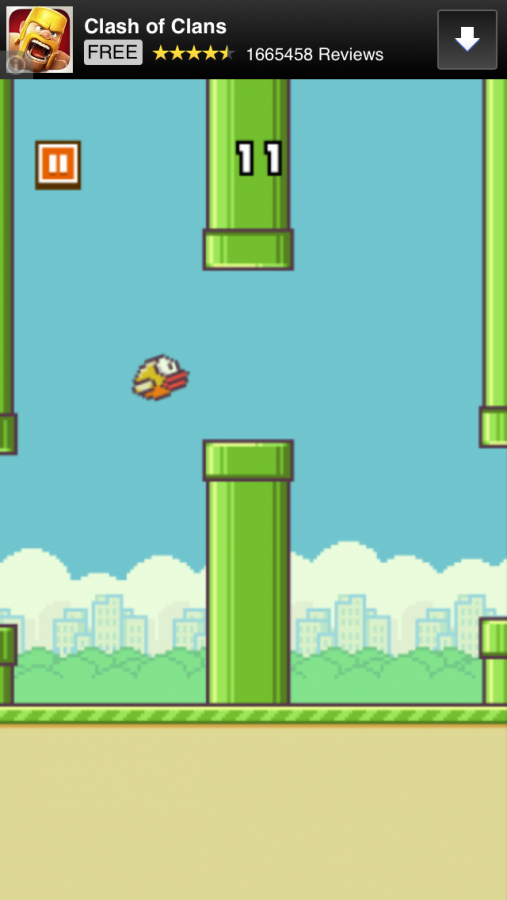
Few games have become as popular and widespread as Flappy Bird. Just a few weeks ago, it became a must-have app on Apple’s App Store and Google Play and has caught the attention of many University High School (UHS) students. All around campus, students have been tapping their phone screens, maneuvering a bird through spaces between pipes. The game was downloaded over 50 million times, according to Straits Times. People all over the world have shared in the joy of breaking a high score and in the distress of tapping the screen at the wrong time. Read more reviews about the app here.
The international sensation came to an abrupt turn when its developer Dong Nguyen announced on February 8 that he would remove the game from app stores the following day. On his Twitter account, he expressed frustration that the game ruined his “simple life” and that he had difficulty coping with its sudden popularity. He later explained in an interview with Forbes magazine, “Flappy Bird was designed to play in a few minutes when you are relaxed, but it happened to become an addictive product.” Nguyen felt that taking down Flappy Bird was the best solution to this “problem.”
Although Flappy Bird can be addicting, calling it problematic is unfair. An app is defined on Dictionary.com as a “program that is written and designed for a specific need or purpose,” and the game Flappy Bird clearly fits the description. Nguyen intended his product to provide mental relief and entertainment. His app exceeded expectations and entertained millions of players.
Most app developers would be excited if their apps could reach and captivate such a wide audience as Flappy Bird. Removing an app because of its widespread appeal is quite conflicting with the interests of an average developer.
Because Flappy Bird’s graphics closely resemble those of Nintendo’s famous Mario Brothers games, some sources claim that Nguyen was forced to remove the game under legal threat from Nintendo. However both Nguyen and Nintendo have released statements assuring the public that no copyright lawsuits or legal issues were responsible for the removal, according to The Wall Street Journal. Other sources have claimed that death threats Nguyen received from Twitter users were what led him to remove Flappy Bird. Ironically, Nguyen’s death threats have increased since he announced the removal of Flappy Bird. If death threats were the cause of Flappy Bird’s removal, Nguyen’s actions have unfortunately had a backwards effect.
Following Nguyen’s announcement, Flappy Bird downloads reached a staggering 50 million. Rumors stated in Forbes magazine suggested that Nguyen strategically removed the game to increase publicity and thereby generate more revenue. Although these allegations are plausible, they are illogical because keeping the game in the market would have made more money for Nguyen. At the time of the announcement, the number of downloads of Flappy Bird was rapidly increasing by the millions, and Nguyen was making $50,000 a day through advertisements. It is likely that the number of downloads would have reached 50 million even without the timely announcement.
The most probable explanation for the removal of the game is that Dong Nguyen was simply overwhelmed by the sudden success of Flappy Bird. Having been a relatively unknown app developer only several weeks ago, Nguyen was unaccustomed to fame and wanted to escape from the public eye. Unfortunately, his justifications for the removal are questionable, and his announcement of the removal ironically increased publicity of his game. We may never debunk rumors about the removal of Flappy Bird or understand Nguyen’s motives completely, but one thing is clear: it is important to be fully committed to something you make.
Written by ANDREW HONG
Staff Writer









